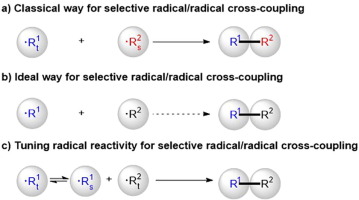Science Bulletin ( IF 18.8 ) Pub Date : 2018-06-07 , DOI: 10.1016/j.scib.2018.06.004 Shengchun Wang 1 , Shan Tang 1 , Aiwen Lei 1

|
Radical/radical cross-coupling represents a straightforward way for the construction of new chemical bonds in theory and has received more and more attention over the past several years. Until now, it is challenging to achieve the selective bond formation between two transient radicals since selective radical cross-coupling usually happens between persistent radical and transient radical. However, the number of persistent radicals is much less than that of transient radicals. These issues limit the application of radical/radical cross-coupling in the construction of new chemical bonds. To solve this, we proposed a novel strategy “tuning radical reactivity” that could tune transient radical into persistent radical. This paper will introduce the concept and recent developments of “tuning radical reactivity”.
中文翻译:

调整选择性自由基/自由基交叉偶联的自由基反应性
自由基/自由基交叉偶联在理论上代表了一种构建新化学键的直接方式,并且在过去几年中受到越来越多的关注。到目前为止,由于选择性自由基交叉偶联通常发生在持久自由基和瞬时自由基之间,因此实现两个瞬态自由基之间的选择性键形成具有挑战性。然而,持久性自由基的数量远少于瞬时性自由基。这些问题限制了自由基/自由基交叉偶联在新化学键构建中的应用。为了解决这个问题,我们提出了一种新策略“调节自由基反应性”,可以将瞬时自由基调整为持久自由基。本文将介绍“调谐自由基反应性”的概念和最新进展。











































 京公网安备 11010802027423号
京公网安备 11010802027423号